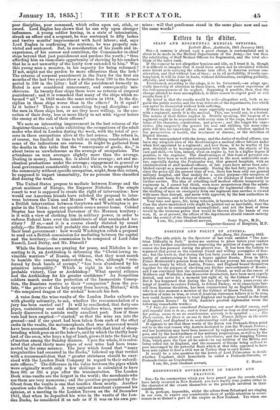itttrro In tht thitur.
STAFF AND REGIMENTAL MEDICAL OFFICERS.
Lesketh How, .Ambkside, 10th January 1855. Snt—A rumour is abroad taat a great change is contemplated and is about to be made in the Medical Departments of the Army,—no less than the substituting of Staff Bleclical Officers for Regimental, and the total abo- lition of the latter rank.
If the rumour be not altogether baseless and idle, as I trust it is, though it is difficult to imagine that it could have arisen and be circulated without some intent as to carrying the scheme into effect, it deserves serious con- sideration, and that without loss of time ; as in all probability, if really con- templated, it will be done in haste, without deliberation, excepting partially, officially, and without appeal. Forewarned, according to the adage, is to be forearmed,—an adage spe- cially deserving of attention in these times, with our recent experience of the evil consequences of its neglect. Supposing it possible, then, that the change alluded to were accomplished, is there reason to expect good or evil results from it ?
My belief is that the results would be evil—altogether evil, both as re- gards the public service and the true interests of the departments, two which can never be dissociated without both suffering.
If there be any class of officers more especially required to be stationary with a regiment, surely it is the medical. This, one would say, is a truism. The nature of their duties implies it. Strictly speaking, the surgeon of a regiment ought to be acquainted with every man of the corps, have a know- ledge of his character, constitution, and powers' and the longer his expe- rience, (the surgeon's) the greater his zeal and abilities, the more com- plete will this his knowledge be, and the more useful, whether applied to the preservation of health, the treatment of disease, or the detection of feigned disease.
No one unacquainted with the Army, and the duties of medical officera, can have any adequate idea of the disadvantages a medical officer labours under when first appointed to a regiment; and how these, if he be worthy of his post, diminish as he becomes acquainted with the men, the objects of his care and skill,—to him, indeed, what an engine is, but in a higher degree if possible, to the engineer. The disadvantages of this want of personal ex- perience have been so well understood, proved in the most undeniable man- ner, especially during the Peninsular war, that general hospitals, with an administration of staff medical-officers, of late years have never been esta- blished except as a measure of necessity. During the last forty years, that is since the peace till the present time of war, there has been only one general military hospital, and that mainly for a special purpose—the reception of invalids sent home for change of climate, or for discharge if found unfit for further service. The idea of attaching staff medical officers temporarily to regiments is, I cannot but think, even more preposterous than the substi- tuting of staff-officers with temporary charge for regimental officers. Even the drafting of men on emergency from one regiment into another is viewed with more than distrust, and never with approval, by the best authorities in military matters, and for obvious reasons. Your time and space, Sir, being valuable, it becomes me to be brief. Other than the above-mentioned evils might be pointed out as inevitable, were the scheme said to be contemplated accomplished ; and not the least of these would be the immense power that would be thrown into the hands of one man, if, as at present, the affairs of the department should remain entirely under the control of the Director-General.
I am, Sir, your obedient servant, Josef DAVY, M.D., Inspector-General of Hospitals, H.P.






























 Previous page
Previous page